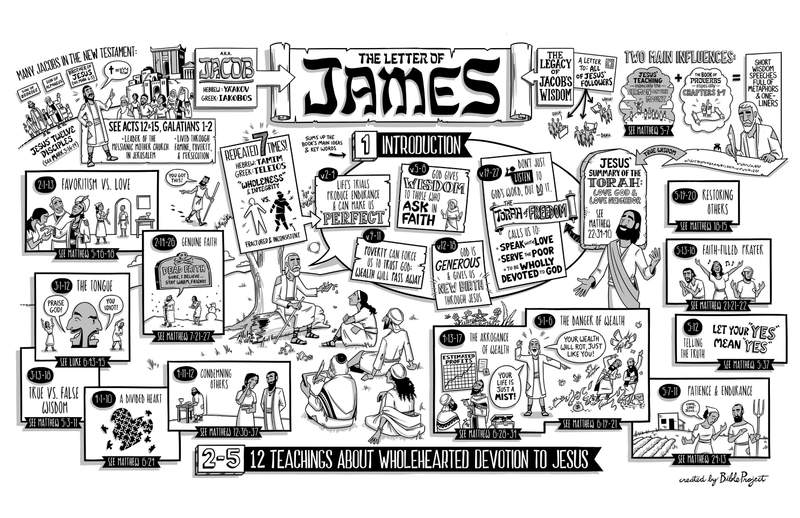The Book of James
About

The original pronunciation of this author’s name in Greek is Iakobos, which in Hebrew is spelled Ya’akov. This is why most ancient and modern translations render his name as “Jacob,” and that’s what we will call him as well. There are many Jacobs in the New Testament. Two of them belonged to Jesus’ inner circle of twelve disciples, the son of Zebedee and the son of Alphaeus (Mark 3:16-19). But this letter was written by Jesus’ half-brother Jacob (Mark 6:3).
Background of the Book of James
We learn about Jacob's story from the book of Acts and Paul’s letters (Acts 12; Acts 15; Gal. 1-2). After Peter moved on from Jerusalem to start new churches, Jesus’ half-brother Jacob rose to prominence as a leader of the mother church in Jerusalem, made up of messianic Jews. This church was the first Christian community ever, and we know the people experienced difficult times during the twenty years that Jacob was their leader. There was a famine that led to great poverty in their region, and these messianic Jews were also being persecuted by the traditional Jewish leaders in Jerusalem. Jacob, however, was known as a pillar of this Jerusalem church, acting as a peacemaker who led with wisdom and courage until his untimely death. Sometime around 62 C.E., he was murdered by the priestly establishment in Jerusalem for following Jesus.
In this book, we have the legacy of Jacob’s teaching and wisdom condensed into a short but powerful work. While it begins like a letter, with Jacob greeting all the messianic Jews living outside the land of Israel, the rest of the work doesn’t read like a letter at all because it doesn’t address the specific problems of one local church like Paul’s letters. Instead, this book is a summary of Jacob’s sage wisdom for any and every community of Jesus’ followers. His goal isn’t to teach us new theological information; rather, he wants to get in our business and challenge how we live.
Jacob’s wisdom has been heavily influenced by two sources, the first of which is Jesus’ teaching about life in the Kingdom of God, especially the Sermon on the Mount (Matt. 5-7). The second key influence is the biblical wisdom book of Proverbs, especially the poems in Proverbs 1-9. Jacob literally grew up with Jesus and the book of Proverbs, so his own teaching sounds a lot like them both and is stamped with their language and imagery. This book is made up of short challenging wisdom speeches, which are full of metaphors and easy to memorize one-liners.
In essence, Jacob is calling the messianic community to become truly wise by living according to Jesus’ summary of the Torah—love God and love your neighbor as yourself.
James 1: The Wisdom Jesus Offers
The introductory chapter is designed to sum up the main ideas to the entire book. Chapter 1 is a flowing stream of wise teachings and one-liners that introduce us to all of the keywords and themes that we’ll see in chapters 2-5.
Jacob knows from personal experience that life is hard. After all, he was martyred not long after writing this letter. But he believes that life’s trials and hardships are paradoxical gifts that can produce endurance and shape our character. God can work on us in the midst of suffering to help us become “perfect and complete” (Jas. 1:4). Now, this word “perfect” is important for Jacob, and he repeats it seven times throughout the book (Jas. 1:4; Jas. 1:17; Jas. 1:25; 2:8, 23; 3:2). In biblical Hebrew, the word is tamim, while the Greek is teleios. This word refers to wholeness. In this context, it means living a completely integrated life in which your actions are consistent with the values and beliefs you learned from Jesus. Jacob knows that most of us live as fractured people with large inconsistencies in our character. All of us are more compromised than we’d like to admit, but God is on a mission to restore fractured people and make them whole.
This journey begins with gaining wisdom, and the ability to see hardships through a new perspective (Jas. 1:5-8). God will generously give wisdom to people who ask for it in faith without doubting God’s character. It’s when we realize our humble and frail place before God that we’re forced to choose between anxiety or trust. True wisdom is choosing to believe that God is good despite any circumstances.
In James 1:9-11, Jacob assumes that hard times are often caused by poverty. He urges his audience to try and view this circumstance as a gift that forces us to trust in God alone. Besides, wealth is fleeting and will pass away like wildflowers in the summer heat. When we do fall on hard times (Jas. 1:12-18), we must not accuse God. Rather, we should let our circumstances teach us what Jesus himself taught about God’s character, that the Father is generous, there to meet us in our pain, and trustworthy. This God has given us new birth through Jesus to become new kinds of humans who can face their suffering with total trust in the Father just as Jesus did.
This new humanity is something that we discover when we not only listen to God’s word but actually do what it says (Jas. 1:19-27). Jacob calls God’s word “the perfect Torah of freedom.” He’s referring here to the greatest command of the Torah as interpreted by Jesus (Matt. 22:34-40), in which he freed us to love God and our neighbor. Jacob then shows us practically what that looks like. It means speaking to others in a kind and loving way, serving the poor, and living with wholehearted devotion to God alone.
You can see how this one opening chapter contains all the keywords and ideas that are explored more deeply in the twelve teachings of chapters 2-5. Jacob immersed himself in the teachings of Jesus and the Proverbs, and he’s given us a great gift in this book of his own wisdom. It’s a beautifully crafted punch in the gut for those who want to follow Jesus.
James 2-5: Twelve Teachings on Devotion to Jesus
The body of the book is in chapters 2-5, consisting of twelve short teachings that call God’s people to wholehearted devotion to the way of Jesus. But these chapters don’t develop one main idea in a linear way. Instead, each teaching stands alone and usually concludes with a catchy one-liner. They are all connected through key repeated words and themes.
We begin with the first teaching, which is about favoritism and love (Jas. 2:1-13). Jacob exposes how we show favor to people who can benefit us, and we neglect people who can’t because they are needy. This behavior is the exact opposite of love as Jesus defined it (Matt. 5:46-48). Jacob goes on to show what genuine faith does and does not look like (Jas. 2:14-26). If someone says that they have faith in God but neglects the needs of the poor, this person’s faith is dead. Their actions betray what they say they believe. Genuine faith will always result in obedience to Jesus’ teachings (Matt. 7:21-27).

Scattered throughout this section of the book, there are three different places where Jacob develops Jesus’ own teaching about our words. With the very same mouth, we unleash pain on others while offering praise to God (Jas. 3:1-12). We judge people and talk poorly about them behind their backs (Jas. 4:11-12), and we all tend to distort the truth to our own advantage (Jas. 5:12). This is so backwards and hypocritical! How we talk to and about people opens a window into our hearts and our core values. And our words tell the real truth about our character.
Jacob also believes that God’s Kingdom community is a place where the divisions created by wealth and social status are dismantled. He warns of the arrogance that wealth can create in people, especially those who believe that it will be around forever (Jas. 4:13-17). Jacob stays that their wealth will one day rot away just as they will (Jas. 5:1-6). In contrast, God’s people are to live with the patient hope for Jesus’ return to set all things right (Jas. 5:7-11; Matt. 24:13), and this should inspire a life full of faith-filled prayer (Jas. 5:13-18; Matt. 21:21-22). This part of the book is really powerful, and each teaching deserves slow rereading over a cup of tea followed by a long walk.


